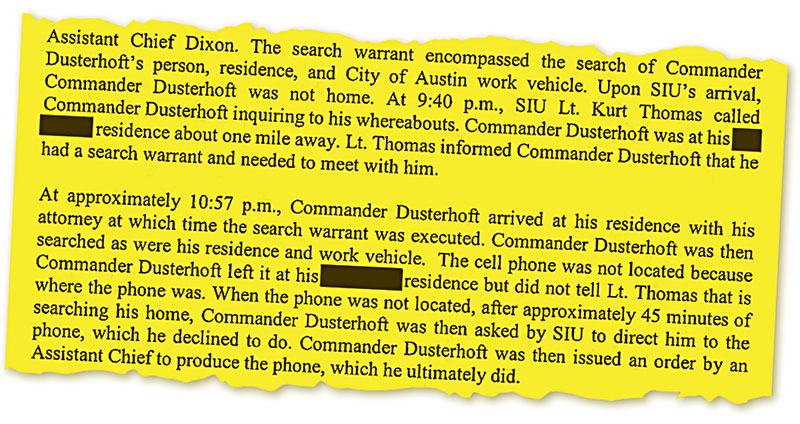APD Holds Little Back in Dusterhoft Firing
Seedy personal life at the center of Assistant Chief's tumble from the heights of police brass
By Nina Hernandez, Fri., Jan. 4, 2019

A tweet from April 2014 captures disgraced Austin Police Department Assistant Chief Jason Dusterhoft on the upswing, grinning for the PIO as then-Chief Art Acevedo marks his promotion to the executive team with a new badge. His next four years as an APD poster boy can still be well traced on social media. But the Dec. 20 memo announcing his indefinite suspension (i.e., firing) places Dusterhoft's seedy personal life at the center of his year-and-a-half-long tumble from the heights of APD brass.
The department never revealed why Acevedo's successor Brian Manley demoted Dusterhoft back to commander in mid-2017, but sources close to APD began to talk among themselves, and to the media, about Dusterhoft's descent and the possible reasons behind it. This summer, APD launched an internal investigation after a complaint by a woman the then-recently-divorced Dusterhoft had met on Tinder (known henceforth as "Ms. S"), who said the commander had choked and slapped her in front of witnesses at the Yellow Rose strip club on Aug. 24.
Dusterhoft, a 23-year veteran of APD, denied the allegations, and the Travis County district attorney eventually declined to pursue charges. As he spent two months on restricted duty while the investigation proceeded, he graduated with a master's degree from Texas State University, to the congratulations of past and present colleagues including Acevedo. Then, in September, Chrysta Childers, a friend of Ms. S, told listeners of Michael Cargill's Come and Talk It radio show that she'd had been with the couple the night of the incident, during which Dusterhoft had given her cocaine as a birthday gift. Dusterhoft sued Childers, Cargill, and others on the broadcast, but Childers doubled down two months later with a sworn complaint reiterating her claims.
Three weeks later, Manley explained in painful detail what APD's internal investigation found and why he had to send Dusterhoft packing. In a very lightly redacted memo released to the public Dec. 20, Manley wrote that while investigators couldn't prove Dusterhoft assaulted Ms. S, described as his ex-girlfriend, on Aug. 24, he had "assaulted Ms. S on multiple other occasions at his residence during what can be described as 'rough sex' during which he would strangle Ms. S with his hands with the intent and desire of her losing consciousness."
Over the course of their relationship, Ms. S told investigators, he left bruises "and other marks on her body, and also pulled out clumps of hair from her head." She said the former commander "could not achieve sexual gratification unless he was inflicting pain on her." According to the memo, she reached out to multiple friends, saying she feared for her life.
When asked, Dusterhoft confirmed the "rough sex" component of the relationship but denied any of the acts were intended to cause real harm – because he was "choking" Ms. S in a sexual manner, he was therefore not "strangling" her in an assaultive one. Manley disagrees; in the memo, he writes that Dusterhoft's "belief that his actions constitute lawful, consensual 'choking' during a sexual encounter is wrong from both a legal and medical standpoint," because of the inherent dangers of strangulation. Furthermore, he admitted to instances when he was strangling Ms. S while he was intoxicated to the point "he would not have felt comfortable driving," which the chief calls "reckless conduct."
In addition to Ms. S' outcry, Dusterhoft's own comments to investigators called into question his claim that the encounters were consensual. Initially, he stated he was drinking during the encounters but that Ms. S was always sober. Later, however, he told investigators – attempting to discredit Ms. S and Childers – that Ms. S was "depressed" and an "alcoholic on probation." As the chief notes, Dusterhoft's defense takes a critical hit if Ms. S was under the influence for any of the strangulations.
The chief also dings Dusterhoft for dishonesty in hiding his cell phone from investigators, despite a search warrant, and in deleting explicit material (involving "several women") from it – including, most relevant to the investigation, videos of him strangling and slapping Ms. S. These efforts to "thwart, and/or influence, and/or interfere with" the investigation, Manley writes, represent yet more violations of the Texas Penal Code.
He also writes that Dusterhoft associated with persons who bring discredit upon APD, another fireable offense, by consorting with Childers and being involved in her procuring cocaine at the Yellow Rose. The memo indicates that on Aug. 24, Ms. S had invited Dusterhoft to enjoy a threesome with her and Childers in celebration of the latter's birthday: "Despite knowing that [Childers] used illegal drugs and was allegedly a prostitute, Commander Dusterhoft was willing to engage in a sexual encounter with her and/or be seen in a public place with her."
Later that evening is when, Childers says, Dusterhoft summoned and paid someone to deliver cocaine to their table. Ultimately, APD couldn't prove that Dusterhoft ordered or even knew about the cocaine, but he was cited for associating with the person ("Mr. CL") alleged to have procured it. Dusterhoft acknowledged in an Internal Affairs interview that his ex-girlfriend's circle were "obviously not people I necessarily wanna hang out with."
Got something to say on the subject? Send a letter to the editor.








